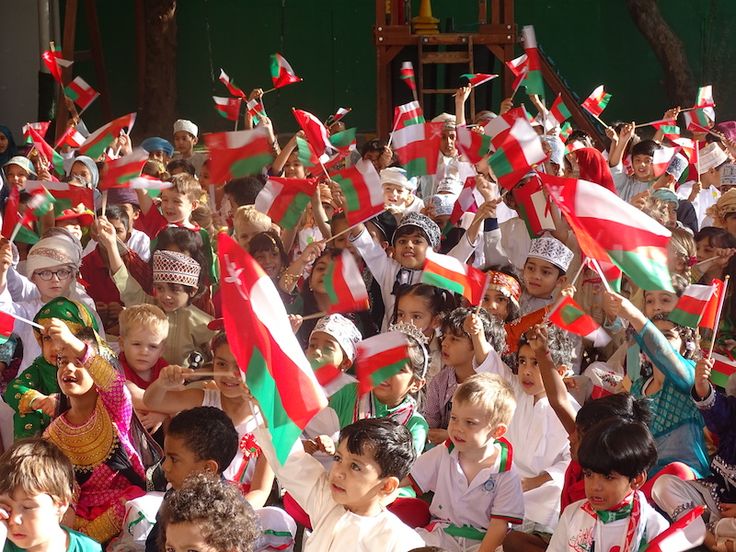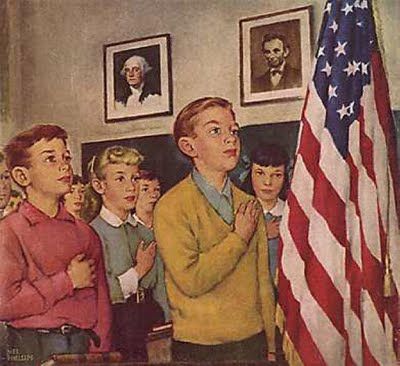Flags line the streets and public spaces. Cars and trucks are decorated with symbols of the country and its leader. On the evening of this national holiday people line the streets as cars pass by with people hanging out of windows and sunroofs waving flags, honking horns, and partying late into the night.
There are even fireworks.

The flags in this case are red, green, and white. The images plastered on cars and trucks are that of Sultan Qaboos. The day is November 18th, and the city is Muscat, Oman. The Omanis are usually sedate people, but on their National Day, they become more energetic than one would imagine possible if you witnessed their behavior just a few days before.

Each summer we come back to the US to escape the 120-degree heat, to connect with supporters of Al Amana Centre, and spend time with family and friends. One of the highlights of each summer are the Fourth of July parades with candy being thrown to eager children, the fireworks that night, and the BBQ by the lake with my in-laws or on my parents’ boat in Muskegon.
Every nation and people have their chosen stories of glory and pride.
The Omanis, even though they are an old and ancient country and people, celebrate the birthday and reign of Sultan Qaboos, who came to power in 1970. They call it “The Renaissance,” because the story is that Sultan Qaboos brought them into the modern world and created a society that benefited all Omanis. Before Sultan Qaboos came to power there were no schools, hospitals, or many paved roads. Now there are schools and clinics in every city and village. Everyone has access to clean water, education, and healthcare. The highway and road system throughout the entire country is a marvel to behold.

In the US, we tell the story of the founding of our country with a Declaration of Independence from a tyrannical British monarchy. We tell stories of freedom and liberty. We hear of heroes who died for our freedom, and of founding fathers who were the wisest of the wise.
Every nation and people have their stories that are told and retold. Truth and legend mix to create a story that affects the identity of everyone who tells, retells, and hears the narrative of the nation’s glory. Many times we think our story is the only story, or the only “good” or “right” story. But there are many people in this world who don’t share our identity or views.
Early on in our time in Oman, we took a group of students to the Hindu temple in Muscat. I brought my sons, aged 8 and 5, if I rightly remember. On the way home the car was silent until my eight-year-old asked me, “Daddy are we Christian because you and mommy are Christian? If you were Hindu, would we be Hindu? If you were Muslim, would we be Muslim?”
Most of the stories that are ingrained into our personal narrative are woven into us by our families and communities of birth. They are not stories that we choose for ourselves, but are ones given to us before we are conscious of our world. My son recognized this much earlier in life than I did.
I replied to my son, “Yes, and when we had you baptized, we promised to raise you in faith centered on Jesus. But you can decide for yourself one day what you believe, and no matter what Mommy and Daddy will love you.”
After a few moments of silence he proclaimed, “I believe what you and mommy believe.” A few moments later his younger brother chimed in, “Well I believe 10×10=100 and 12×12=144.” Ten years later we still love both of our kids, even though this still pretty much sums up a lot about both of them.
One of the joys and challenges of moving away from the community of my birth has been encountering other people’s formative narratives. Whether they are religious narratives, national narratives, or cultural ones, they have been largely different from mine. Most of the time the narratives can live alongside each other in relative peace. Other times our narratives might rub against each other or even clash.
The hardest times have been when other people’s stories make me re-think or reframe the ones I have held since I was a child.
Living in a peaceful monarchy like Oman, I’ve had to reflect on the benefits and challenges of a story that says democracy is the only way to have peace and prosperity.
Living with Muslims who are just as committed and fulfilled in their faith as I am in mine has made me wrestle with God and the picture of God painted for me by the people of faith who raised me.
Walking with people who have been, or whose families have been, the “collateral damage” of American wars in the Middle East makes me struggle with what is a “just war” and what the true cost is for Americans to feel safe behind their wall of defense spending.
There is much that I love about the American story. I am still committed to the Gospel story. But I value that there are other stories out there, other narratives that shape good and faithful people. I think there is much we can learn from stories that are not our own.
As we celebrate the Fourth of July this year, I sense that the story of America is still being written. There is tension and different interpretations of our past and hopes for our future. What stories will we tell the next generation of Americans? How will they form their identity and shape what is to come.
All the while, I hope we remember that ours is not the only story to be told.


6 Responses
A valuable reminder that monarchs can be merciful, and that some Islamic societies are more tolerant of their Christian minorities than our allegedly Christian society is of its Muslim minority. (A thing of the past? Walk for a day in the shoes of Zohran Mamdani, NY mayoral candidate, whose primary victory triggered death threats and demands to strip him of citizenship.) But Sultan Qaboos has a few traits in common with his US counterpart, such as regarding his own authority as unlimited. And a love of big, expensive things such as the royal yacht, which he insisted (so I was told when we visited Al Amanda) must be larger than the UK monarch’s. I hope the orange-haired man is not a reader of the RJ or he’ll demand a still bigger one.
Al Amana (spellcheck, get thee behind me).
Thanks, Justin. The National Day observance was restrained when we were in Oman two years ago. Looking forward to celebrating with Omanis when we are at Al Amana in November.
Thank you, Justin. Beautifully said on this day of commemoration.
I’m a TCK (third culture kid) and this year I’ve been reflecting on how I experienced patriotism as an American abroad. This blog gave me company along that line of self-inquiry. Thank you!
Thanks for this Justin. American
(or British, German or Jewish) exceptionalism takes us down a dangerous path.